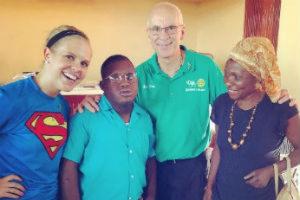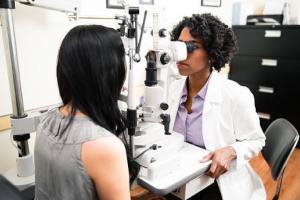
Last summer, CooperVision invited 1st year optometry students to apply for an unforgettable summer myopia management immersion experience with a leading doctor in the country. In partnership with three schools and colleges of optometry, we matched the winners of a 2.5-minute video application to one of four doctors nationwide. They then had the opportunity to spend up to 8 weeks fully immersed in the management of myopia in practice. Here, Adrian Velasco shares a little about his immersion experience with Dr. Aamena Kazmi of Bellaire Family Eye Care.
How did you prepare for your presentation to the Bellaire staff? What do you feel is most important for staff to know, say, and do?
At the beginning of my internship, both Dr. Kazmi and Dr. Richdale sent me a few research articles regarding the different types of myopia management options. I used these studies, and a few others presented in one of my spring courses, to gather relevant information for my presentation. The goal of my presentation was to show the severity of the myopia epidemic and to give the staff more insight on the patients they are interacting with on a daily basis. We defined myopia, its risk factors, associated pathologies, what causes progression, and what methods have been proven to help slow further progression. During the presentation, staff were given some trial lenses to simulate a moderate and high myope. This demonstration allowed them to better appreciate how helping slow one's progression by a few diopters can drastically affect quality of life. With the information presented, I feel that the staff are better equipped to answer questions about myopia management and hope that they use what they learned to spread awareness in their communities by educating parents of children at high risk.
What were your observations on the delivery of myopia management care at Bellaire and the University Eye Institute at University of Houston College of Optometry?
What I appreciated most about both practices is the evidence based approach to myopia management. Dr. Kazmi and Dr. Richdale used high quality studies to guide all of their decisions and to consult parents. On top of that, I love that both doctors are passionate about making an impact in this fight against myopia and do everything in their power to educate patients and parents on why it is so important to treat.
If you could emulate three things about Dr. Aamena Kazmi, what would they be?
If I had to choose three qualities it would be her intelligence, personality, and passion for her work. She is great at making some of the hardest concepts simple to understand; a skill that is useful when consulting with patients - or a first year intern who asks every question that comes to mind. She is also fun to be around, which makes working with her a breeze and has many patients looking forward to their follow up visits. Last, it's easy to tell she truly cares for her patients and takes pride in her work as an optometrist and that is the quality I look up to the most.
How has this experience changed your outlook on the next three years of optometry school and beyond?
Working in Dr. Richdale’s myopia management clinic was such a great experience because it gave me an inside look of what my clinical rotations will look like for the next few summers. I really enjoyed the patient interactions, hands-on experience, and independence that was given to the fourth-year students and that is something I am looking forward to experiencing again soon. Working with myopia management patients this summer was incredibly fulfilling and is something I cannot wait to implement in my future as an optometrist.
Adrian Velasco graduated from the University of Houston with a Bachelor of Science degree in Biochemistry and a minor in Chemistry. During his undergraduate studies he was a member of the Spirit of Houston Marching Band, UH Ultimate Frisbee Team, and Pre-Optometry Professional Society. He is now attending the University of Houston College of Optometry and is set to graduate in 2024. His interest in managing the progression of myopia in adolescent and pediatric patients stems from his work as a swim team coach where he found his passion for working with children of all ages.








